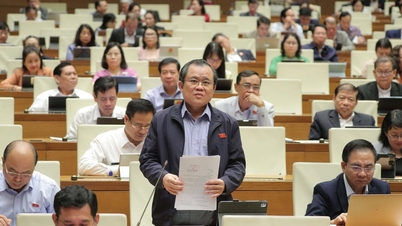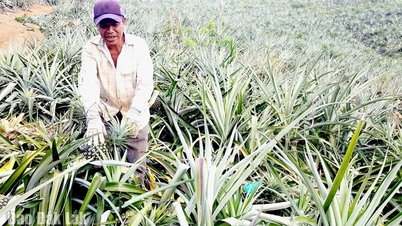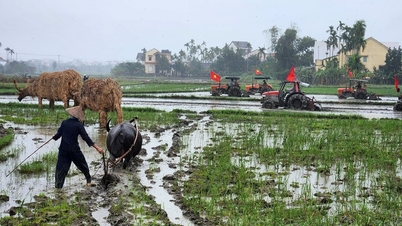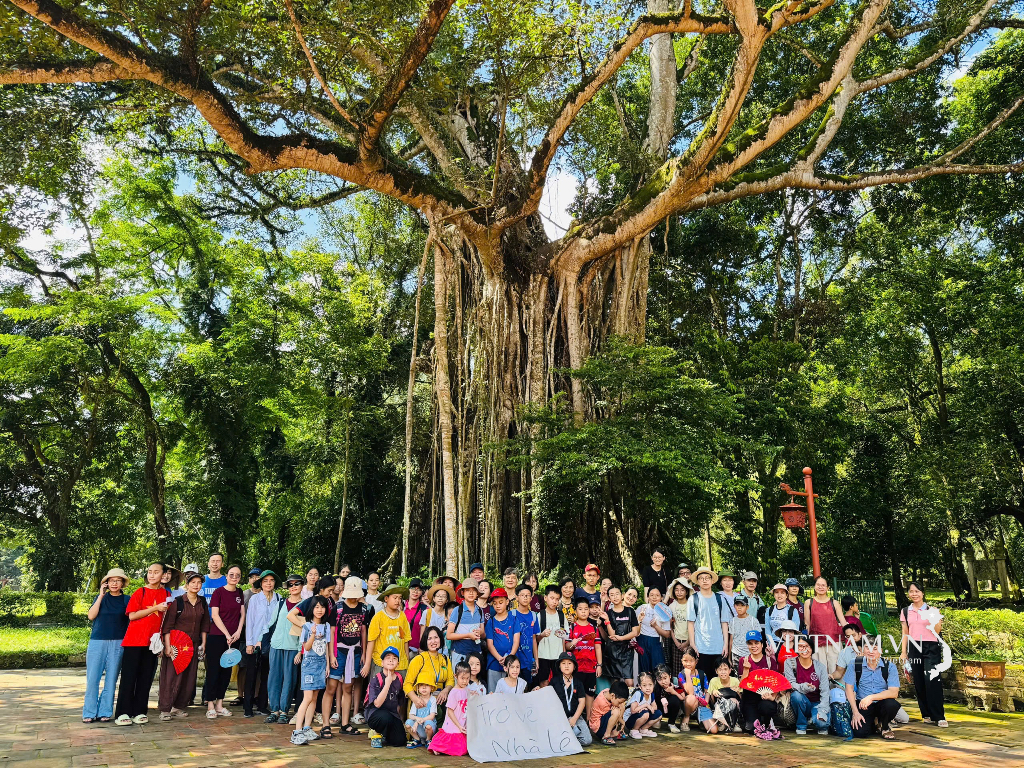
However, during the implementation process, people still have concerns and worries about their personal data being leaked, misused, or even used in scams if the information collection is not seriously secured.
Investigations in several wards and communes in Hanoi show that residents strongly support and desire a transparent land data system. Ms. Hoang Thi Thu Hong from Bach Mai ward (Hanoi) said: "The review and cleaning of land data being implemented nationwide is very necessary. In reality, many land ownership certificates were issued a long time ago, and the users have changed but the data has not been updated. If done correctly, the information will be more transparent, avoiding future disputes."
Sharing the same view, Mr. Vu Van Toan, residing in Thanh Xuan ward (Hanoi), said that if the land and population databases were synchronized, administrative procedures would be faster and less cumbersome. When selling land or transferring ownership, there would be no need to go through the hassle of obtaining confirmations anymore. Ultimately, the people would be the beneficiaries.
The views of Ms. Ha and Mr. Toan are not unique. Many people understand that for genuine digital transformation, the data foundation must be accurate. Ms. Nguyen Ngoc Trinh, Secretary of the Party cell of 11 residential clusters in Bach Mai ward, said that ward officials were mobilized to each residential group to support residents in declaring and updating information. Some places allow the submission of copies or photos of land ownership certificates and citizen identification cards via electronic applications, saving time and effort. Residents highly appreciate this approach as "fast, efficient, and transparent."
Besides the positive aspects, people also have many concerns and fears about the risks of privacy violations and personal data leaks if the implementation is half-hearted, such as collecting photocopies of land ownership documents, land titles, citizen identification cards and storing them scattered around without proper disposal plans, and lacking access control… This is not yet a “ human rights violation” in the broad sense, but it is a legal and social issue that needs to be considered and addressed promptly.
Ms. Tran Hoai Thu, residing in Cua Nam ward (Hanoi), stated that the ward authorities announced she must submit photocopies of her land ownership certificate and citizen identification card within 10 days, otherwise her rights would be affected later. However, Ms. Thu still feels uneasy because these are original documents containing important information, and their leakage could cause significant problems. Many others have reported receiving calls from real estate agents just one day after submitting their documents, raising suspicions that their personal information had been leaked.
Mr. Nguyen Van Khuong, residing in Phu Dien ward (Hanoi), shared that after submitting a photocopy of his land ownership certificate to the neighborhood committee the day before, he received a call the next day asking if he wanted to sell the land. He wondered if it was a coincidence or if the data had leaked. This coincidence has increased people's anxiety and apprehension about having to submit photocopies of land ownership documents and citizen identification cards. Therefore, many people believe that collecting paper data manually when the electronic system already has the information is "cumbersome and potentially risky."
Lawyer Nghiem Thi Hang from Vu Linh Law Office (Hanoi Bar Association) commented that, according to Decree 13/2023/ND-CP on the protection of personal data, the collection of personal information must have a clear purpose, inform the public, and ensure secure storage. If local authorities do not have strict procedures and cannot control who accesses records, the risk of information leakage is real.
Regarding this issue, Mr. Pham Van Tinh, Deputy Director of the Hanoi Land Registration Office (Hanoi Department of Agriculture and Environment), said that in the context of reorganizing the two-tiered local government model, complete and accurate land data will help local authorities have the tools to process administrative procedures right at the commune, ward, and town levels. People will no longer have to travel frequently, and documents will be processed electronically, saving time and costs.
Regarding the requirement for citizens to provide photocopies of their Land Use Right Certificates and Citizen Identity Cards, Mr. Pham Van Tinh explained that this is due to the fact that the information about land users, including land information and identity card/citizen identification card details on the issued certificates, has been formed over many periods, under different management, storage, and technological conditions.
Meanwhile, some people arbitrarily transfer land, change its purpose of use, or conduct transactions using handwritten documents, or incomplete inheritance rights, resulting in current data being incomplete, inaccurate, and inconsistent. The "campaign to enrich and clean up" the land database aims to build an information system that is "accurate - complete - clean - vibrant - unified - shared," serving transparent and efficient state management, while also facilitating citizens and businesses in carrying out administrative procedures related to land on the National Public Service Portal.
To achieve this, the participation of the entire political system and community is needed, in which land users and owners of assets attached to the land play a crucial role in providing and verifying accurate information - Mr. Pham Van Tinh informed.
Regarding concerns about data leaks among the public, legal expert Nguyen Thi Kim Lien believes these concerns are justified and that data collection should be limited by requiring citizens to submit photocopies. Loosely stored documents, not centrally managed, pose a high risk of data leakage. Therefore, citizens should be encouraged to take photos with digital signatures, submit electronic declarations, or have inspectors conduct on-site assessments. If document collection is mandatory, a receipt must be issued, the records centrally managed, and a secure destruction process established.
Furthermore, the State needs clear guidelines on who can access the data, its purpose of use, storage duration, and technical measures (encryption, access control). While human resources at the commune and ward levels are not yet fully trained in data security, personal information related to land ownership certificates and citizen identification cards is sensitive data, so extreme caution is needed in collecting this information, and it must be processed according to regulations," emphasized Ms. Nguyen Thi Kim Lien.
Source: https://baotintuc.vn/bat-dong-san/chien-dich-90-ngay-lam-sach-du-lieu-dat-dai-nguoi-dan-vua-tin-tuong-vua-ban-khoan-20251022144636174.htm


![[Photo] Prime Minister Pham Minh Chinh receives Lao Minister of Education and Sports Thongsalith Mangnormek](/_next/image?url=https%3A%2F%2Fvphoto.vietnam.vn%2Fthumb%2F1200x675%2Fvietnam%2Fresource%2FIMAGE%2F2025%2F12%2F16%2F1765876834721_dsc-7519-jpg.webp&w=3840&q=75)

![[Live] 2025 Community Action Awards Gala](/_next/image?url=https%3A%2F%2Fvphoto.vietnam.vn%2Fthumb%2F1200x675%2Fvietnam%2Fresource%2FIMAGE%2F2025%2F12%2F16%2F1765899631650_ndo_tr_z7334013144784-9f9fe10a6d63584c85aff40f2957c250-jpg.webp&w=3840&q=75)
![[Image] Leaked images ahead of the 2025 Community Action Awards gala.](/_next/image?url=https%3A%2F%2Fvphoto.vietnam.vn%2Fthumb%2F1200x675%2Fvietnam%2Fresource%2FIMAGE%2F2025%2F12%2F16%2F1765882828720_ndo_br_thiet-ke-chua-co-ten-45-png.webp&w=3840&q=75)
![[Photo] Prime Minister Pham Minh Chinh receives the Governor of Tochigi Province (Japan)](/_next/image?url=https%3A%2F%2Fvphoto.vietnam.vn%2Fthumb%2F1200x675%2Fvietnam%2Fresource%2FIMAGE%2F2025%2F12%2F16%2F1765892133176_dsc-8082-6425-jpg.webp&w=3840&q=75)






































































































Comment (0)